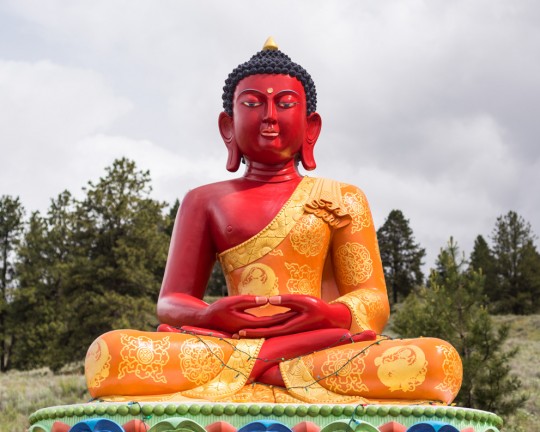- Home
- FPMT Homepage
Foundation for the Preservation of the Mahayana Tradition
The FPMT is an organization devoted to preserving and spreading Mahayana Buddhism worldwide by creating opportunities to listen, reflect, meditate, practice and actualize the unmistaken teachings of the Buddha and based on that experience spreading the Dharma to sentient beings. We provide integrated education through which people’s minds and hearts can be transformed into their highest potential for the benefit of others, inspired by an attitude of universal responsibility and service. We are committed to creating harmonious environments and helping all beings develop their full potential of infinite wisdom and compassion. Our organization is based on the Buddhist tradition of Lama Tsongkhapa of Tibet as taught to us by our founders Lama Thubten Yeshe and Lama Thubten Zopa Rinpoche.
- Willkommen
Die Stiftung zur Erhaltung der Mahayana Tradition (FPMT) ist eine Organisation, die sich weltweit für die Erhaltung und Verbreitung des Mahayana-Buddhismus einsetzt, indem sie Möglichkeiten schafft, den makellosen Lehren des Buddha zuzuhören, über sie zur reflektieren und zu meditieren und auf der Grundlage dieser Erfahrung das Dharma unter den Lebewesen zu verbreiten.
Wir bieten integrierte Schulungswege an, durch denen der Geist und das Herz der Menschen in ihr höchstes Potential verwandelt werden zum Wohl der anderen – inspiriert durch eine Haltung der universellen Verantwortung und dem Wunsch zu dienen. Wir haben uns verpflichtet, harmonische Umgebungen zu schaffen und allen Wesen zu helfen, ihr volles Potenzial unendlicher Weisheit und grenzenlosen Mitgefühls zu verwirklichen.
Unsere Organisation basiert auf der buddhistischen Tradition von Lama Tsongkhapa von Tibet, so wie sie uns von unseren Gründern Lama Thubten Yeshe und Lama Thubten Zopa Rinpoche gelehrt wird.
- Bienvenidos
La Fundación para la preservación de la tradición Mahayana (FPMT) es una organización que se dedica a preservar y difundir el budismo Mahayana en todo el mundo, creando oportunidades para escuchar, reflexionar, meditar, practicar y actualizar las enseñanzas inconfundibles de Buda y en base a esa experiencia difundir el Dharma a los seres.
Proporcionamos una educación integrada a través de la cual las mentes y los corazones de las personas se pueden transformar en su mayor potencial para el beneficio de los demás, inspirados por una actitud de responsabilidad y servicio universales. Estamos comprometidos a crear ambientes armoniosos y ayudar a todos los seres a desarrollar todo su potencial de infinita sabiduría y compasión.
Nuestra organización se basa en la tradición budista de Lama Tsongkhapa del Tíbet como nos lo enseñaron nuestros fundadores Lama Thubten Yeshe y Lama Zopa Rinpoche.
A continuación puede ver una lista de los centros y sus páginas web en su lengua preferida.
- Bienvenue
L’organisation de la FPMT a pour vocation la préservation et la diffusion du bouddhisme du mahayana dans le monde entier. Elle offre l’opportunité d’écouter, de réfléchir, de méditer, de pratiquer et de réaliser les enseignements excellents du Bouddha, pour ensuite transmettre le Dharma à tous les êtres. Nous proposons une formation intégrée grâce à laquelle le cœur et l’esprit de chacun peuvent accomplir leur potentiel le plus élevé pour le bien d’autrui, inspirés par le sens du service et une responsabilité universelle. Nous nous engageons à créer un environnement harmonieux et à aider tous les êtres à épanouir leur potentiel illimité de compassion et de sagesse. Notre organisation s’appuie sur la tradition guéloukpa de Lama Tsongkhapa du Tibet, telle qu’elle a été enseignée par nos fondateurs Lama Thoubtèn Yéshé et Lama Zopa Rinpoché.
Visitez le site de notre Editions Mahayana pour les traductions, conseils et nouvelles du Bureau international en français.
Voici une liste de centres et de leurs sites dans votre langue préférée
- Benvenuto
L’FPMT è un organizzazione il cui scopo è preservare e diffondere il Buddhismo Mahayana nel mondo, creando occasioni di ascolto, riflessione, meditazione e pratica dei perfetti insegnamenti del Buddha, al fine di attualizzare e diffondere il Dharma fra tutti gli esseri senzienti.
Offriamo un’educazione integrata, che può trasformare la mente e i cuori delle persone nel loro massimo potenziale, per il beneficio di tutti gli esseri, ispirati da un’attitudine di responsabilità universale e di servizio.
Il nostro obiettivo è quello di creare contesti armoniosi e aiutare tutti gli esseri a sviluppare in modo completo le proprie potenzialità di infinita saggezza e compassione.
La nostra organizzazione si basa sulla tradizione buddhista di Lama Tsongkhapa del Tibet, così come ci è stata insegnata dai nostri fondatori Lama Thubten Yeshe e Lama Zopa Rinpoche.
Di seguito potete trovare un elenco dei centri e dei loro siti nella lingua da voi prescelta.
- 欢迎 / 歡迎
简体中文
“护持大乘法脉基金会”( 英文简称:FPMT。全名:Foundation for the Preservation of the Mahayana Tradition) 是一个致力于护持和弘扬大乘佛法的国际佛教组织。我们提供听闻,思维,禅修,修行和实证佛陀无误教法的机会,以便让一切众生都能够享受佛法的指引和滋润。
我们全力创造和谐融洽的环境, 为人们提供解行并重的完整佛法教育,以便启发内在的环宇悲心及责任心,并开发内心所蕴藏的巨大潜能 — 无限的智慧与悲心 — 以便利益和服务一切有情。
FPMT的创办人是图腾耶喜喇嘛和喇嘛梭巴仁波切。我们所修习的是由两位上师所教导的,西藏喀巴大师的佛法传承。
繁體中文
護持大乘法脈基金會”( 英文簡稱:FPMT。全名:Found
ation for the Preservation of the Mahayana Tradition ) 是一個致力於護持和弘揚大乘佛法的國際佛教組織。我們提供聽聞, 思維,禪修,修行和實證佛陀無誤教法的機會,以便讓一切眾生都能 夠享受佛法的指引和滋潤。 我們全力創造和諧融洽的環境,
為人們提供解行並重的完整佛法教育,以便啟發內在的環宇悲心及責 任心,並開發內心所蘊藏的巨大潛能 — 無限的智慧與悲心 – – 以便利益和服務一切有情。 FPMT的創辦人是圖騰耶喜喇嘛和喇嘛梭巴仁波切。
我們所修習的是由兩位上師所教導的,西藏喀巴大師的佛法傳承。 察看道场信息:
- FPMT Homepage
- News/Media
-
- Study & Practice
-
-
- About FPMT Education Services
- Latest News
- Programs
- New to Buddhism?
- Buddhist Mind Science: Activating Your Potential
- Heart Advice for Death and Dying
- Discovering Buddhism
- Living in the Path
- Exploring Buddhism
- FPMT Basic Program
- FPMT Masters Program
- FPMT In-Depth Meditation Training
- Maitripa College
- Lotsawa Rinchen Zangpo Translator Program
- Universal Education for Compassion & Wisdom
- Online Learning Center
-
- Prayers & Practice Materials
- Overview of Prayers & Practices
- Full Catalogue of Prayers & Practice Materials
- Explore Popular Topics
- Benefiting Animals
- Chenrezig Resources
- Death & Dying Resources
- Lama Chopa (Guru Puja)
- Lama Zopa Rinpoche: Compendium of Precious Instructions
- Lama Zopa Rinpoche: Life Practice Advice
- Lama Zopa Rinpoche Practice Series
- Lamrim Resources
- Mantras
- Prayer Book Updates
- Purification Practices
- Sutras
- Thought Transformation (Lojong)
- Audio Materials
- Dharma Dates - Tibetan Calendar
- Translation Services
- Publishing Services
- Ways to Offer Support
- Prayers & Practice Materials
-
- Teachings and Advice
- Find Teachings and Advice
- Lama Zopa Rinpoche Advice Page
- Lama Zopa Rinpoche: Compendium of Precious Instructions
- Lama Zopa Rinpoche Video Teachings
- ༧སྐྱབས་རྗེ་བཟོད་པ་རིན་པོ་ཆེ་མཆོག་ནས་སྩལ་བའི་བཀའ་སློབ་བརྙན་འཕྲིན།
- Podcasts
- Lama Yeshe Wisdom Archive
- Buddhism FAQ
- Dharma for Young People
- Resources on Holy Objects
- Teachings and Advice
-
-
*If a menu item has a submenu clicking once will expand the menu clicking twice will open the page.
-
-
- Centers
-
- Teachers
-
- Projects
-
-
-
-
*If a menu item has a submenu clicking once will expand the menu clicking twice will open the page.
-
-
- FPMT
-
-
-
-
-
If you have compassion in your everyday life, you collect the most extensive merit and purify much negative karma in a very short time. Many lifetimes, many eons of negative karma get purified. That helps you realize emptiness.
Lama Zopa Rinpoche
-
-
-
- Shop
-
-
-
The Foundation Store is FPMT’s online shop and features a vast selection of Buddhist study and practice materials written or recommended by our lineage gurus. These items include homestudy programs, prayers and practices in PDF or eBook format, materials for children, and other resources to support practitioners.
Items displayed in the shop are made available for Dharma practice and educational purposes, and never for the purpose of profiting from their sale. Please read FPMT Foundation Store Policy Regarding Dharma Items for more information.
-
-
Lama Zopa Rinpoche News and Advice
19
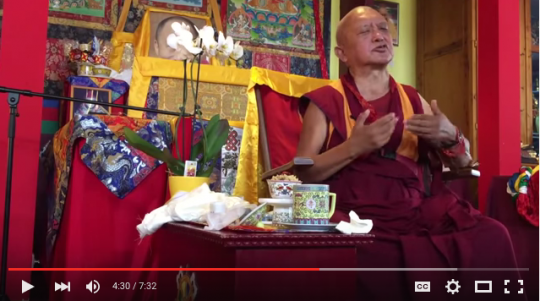
Screenshot from “What to Think When Others Harm You”
“The usual [way of thinking] is that you can harm anybody in the world who you don’t like. You kill, you do every bad thing to others who you don’t like. But, nobody can harm you!” Lama Zopa Rinpoche teaches in a new video on FPMT’s YouTube channel. “You see, that’s the self-cherishing thought – it’s a dictatorship. You can kill anyone you don’t like, but ‘no one can harm me.’ It’s totally unreasonable, not logical; it’s just the dictatorship of the self-cherishing thought. If you are educated, how can you agree with that? If you’re an educated person, if you’re not crazy, how can you agree with that? You can harm anybody, but no one can harm you? This is just falling into self-cherishing. This is all logic; it’s just the self-cherishing thought.
“So in the Bodhisattvacharyavatara it says it’s deserved. Because I harmed that being before, that’s why, now, they harmed me this time. So, I deserve it. … If I didn’t harm other sentient beings in the past, I wouldn’t receive this harm now. …”
Watch “What to Think When Others Harm You” on YouTube:
https://www.youtube.com/watch?v=dpgeOPm_40w
You can watch more video clips of Lama Zopa Rinpoche on FPMT’s YouTube page: http://bit.ly/fpmt-youtube
For longer videos of Rinpoche teaching, visit: http://bit.ly/rinpoche-available-now
Learn more about Lama Zopa Rinpoche, spiritual director of the Foundation for the Preservation of Mahayana Tradition (FPMT), and Rinpoche’s vision for a better world. Sign up to receive news and updates.
- Tagged: lama zopa rinpoche, video, youtube
- 0
18
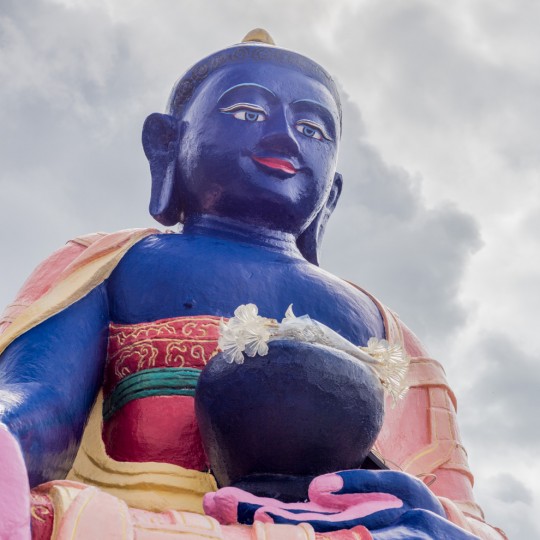
Medicine Buddha statue at Buddha Amitabha Pure Land, Washington, US, June 2015. Photo by Chris Majors.
Wildfires, typhoons, earthquakes and other natural disasters can affect FPMT students, centers, projects and services around the world. And Lama Zopa Rinpoche has given advice on practices for different natural disasters. This advice is always available on Rinpoche’s advice page on FPMT.org:
https://fpmt.org/teachers/zopa/advice/#disasters
Additional advice from Rinpoche on this topic is also available on the Lama Yeshe Wisdom Archive:
https://lamayeshe.com/advice/natural-disasters
The FPMT Foundation Store stocks many protection items that can offer benefit in threatening times. The new Vairochana Mantra Card, for example, protects from harm from “weapons, fire, water, poisons, substances mixed with poisons, black magic; one cannot be harmed by kings, thieves, robbers, and so forth.” Rinpoche has said, “Wherever this mantra is written and left, people do not receive sicknesses, harm and contagious diseases and will achieve the concentration called stainless light.”
Lama Zopa Rinpoche is the spiritual director of the Foundation for the Preservation of Mahayana Tradition (FPMT), a Tibetan Buddhist organization dedicated to the transmission of the Mahayana Buddhist tradition and values worldwide through teaching, meditation and community service.
- Tagged: lama zopa rinpoche, natural disasters
- 0
17
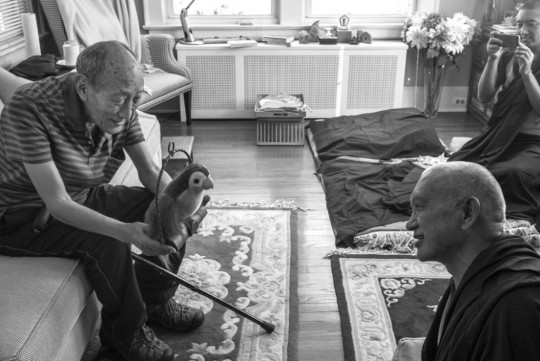
Khyongla Rato Rinpoche with Lama Zopa Rinpoche, New York, August 2015. Photo by Ven. Nicholas Vreeland. Lama Zopa Rinpoche has been receiving oral transmissions from Khyongla Rinpoche.
“Bodhichitta is what makes life most beneficial for oneself and meaningful for every single sentient being that exists, because every single one is suffering and needs help,” Lama Zopa Rinpoche said to a student who asked, “What is the best and quickest way to generate bodhichitta?” Rinpoche’s extensive answer to the question continues:
“Bodhichitta makes your life most beneficial for every single other being, who are countless. Not only is it what makes your life beneficial, but when you are practicing bodhichitta, this fulfills the wishes of all the buddhas and bodhisattvas, because their only wish is the happiness of sentient beings. Buddhas actualize the path, collecting extensive merit of wisdom and of virtue, and purify the defilements, and then they achieve enlightenment in order to be able to perform perfect works, without any error, liberating all sentient beings, without any exception, and bringing them to highest happiness.
“This is the objective of their life, and their only concern is the happiness of others. Their aim is only that. Their concern is sentient beings obscured in suffering. What they cherish is nobody except sentient beings. The thought of seeking happiness for themselves doesn’t arise for even one second after having realizations of bodhichitta. Bodhisattvas, while they have bodhichitta, are like that. Of course, sometimes it is possible for some new bodhisattvas’ realizations to degenerate. Whereas for us, though the thought of cherishing others may arise, it is very rare. Even though it may arise, it does so only very occasionally. It is still not complete. It can still be very weak. The thought of cherishing the ‘I’ is still stronger than the thought of cherishing others. Buddhas also achieve enlightenment only for the benefit of sentient beings. They cherish no one else except sentient beings; they work only for sentient beings.
“When we practice compassion in our daily lives, when we perform actions with the thought of cherishing others, whether it is a small service or a big service, at that time we are fulfilling the wishes of countless buddhas and bodhisattvas. Therefore, practicing bodhichitta, serving others, and cherishing others is the best offering to numberless bodhisattvas and to all the buddhas. It is the best offering. This is what pleases them the most. So, now the purpose of our life is to free countless other sentient beings and bring them to happiness. Since that is the purpose of our life, to do that perfectly, to be a perfect guide, we need full enlightenment, in essence, to have omniscient mind and complete, perfect power to reveal the path to bring sentient beings to enlightenment by liberating them from suffering, and for this we need to complete the mind training in compassion. That is it in essence. …”
Rinpoche’s complete response to the question “What is the best and quickest way to generate bodhichitta?” can be read in the Lama Zopa Rinpoche Online Advice Book on the Lama Yeshe Wisdom Archive under the post “Generating Bodhicitta”: https://lamayeshe.com/index.php?sect=article&id=588
More information, photos and updates about FPMT spiritual director Lama Zopa Rinpoche can be found on Rinpoche’s webpage. If you’d like to receive news of Lama Zopa Rinpoche via email, sign up to FPMT News.
- Tagged: bodhichitta, khyongla rato rinpoche, lama zopa rinpoche
- 0
14
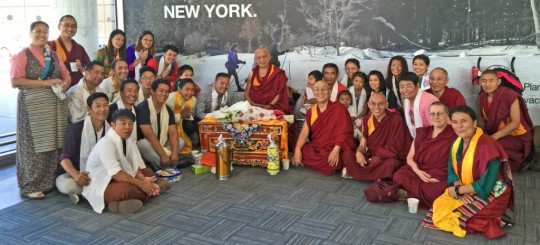
Lama Zopa Rinpoche being greeted at the airport by Sherpas living in New York, July 2015. Photo by Ven. Roger Kunsang.
When Lama Zopa Rinpoche arrived in the United States in late July, he was received with a big Sherpa welcome. About two dozen Sherpas greeted Rinpoche at the airport with khatas, offerings and tea, even bringing a puja table. New York City reportedly has the largest settlement of Sherpa people outside of Nepal and India, numbering 2,500.
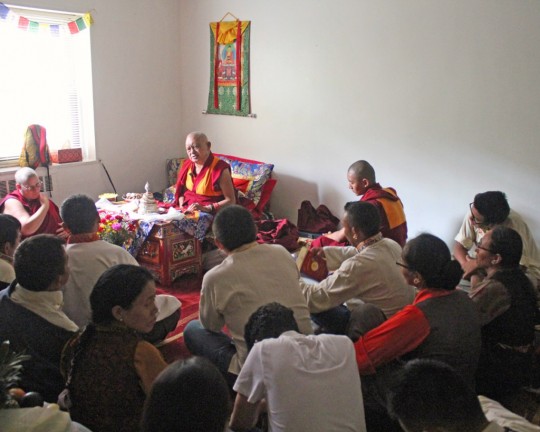
Lama Zopa Rinpoche giving an oral transmission of the Vajra Cutter Sutra to Sherpas in New York City, US, August 2015. Photo by Ven. Lobsang Sherab.
During the New York visit, Rinpoche has already given an oral transmission of the Vajra Cutter Sutra to a gathering of Sherpas and has also done Chöd practice.
On August 30, Rinpoche will give the long life initiation of Most Secret Hayagriva at 10 a.m. at 41 – 01 75th Street, Elmhurst, New York 11373. The initiation is being organized by the Kopan Sherpa Association in New York.
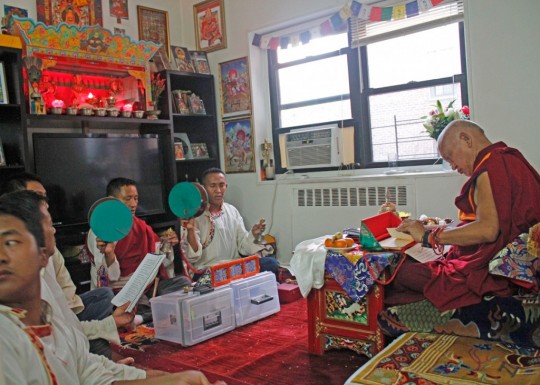
Lama Zopa Rinpoche doing Chöd practice with Sherpas in New York City, US, August 2015. Photo by Ven. Lobsang Sherab.
Rinpoche’s other teachings in New York, organized by Shantideva Center, are on August 21, 27 and 28 at Tibet House. And there will be a Guru Puja with Rinpoche on August 25 at Jewel Heart Center.
More information, photos and updates about FPMT spiritual director Lama Zopa Rinpoche can be found on Rinpoche’s webpage. If you’d like to receive news of Lama Zopa Rinpoche via email, sign up to Lama Zopa Rinpoche News.
- Tagged: lama zopa rinpoche, new york, sherpa
- 0
13
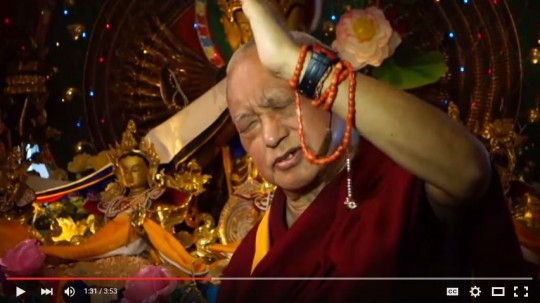
Screenshot from “Check a Religion Like You Would Check Something You Want to Buy”
“Buddha said to examine his own teachings,” Lama Zopa Rinpoche teaches in a new video on FPMT’s YouTube channel, recorded at Kopan Monastery in December 2014. “He advised bhikshus, the monks, ‘Learned ones take my teachings like gold: you burn, cut, rub. Like that, you take my teachings and then practice. Don’t practice blindly.’ Buddha said that. …”
Watch “Check a Religion Like You Would Check Something You Want to Buy” on YouTube:
https://www.youtube.com/watch?v=Kq07yP-tRzs
You can watch more video clips of Lama Zopa Rinpoche on FPMT’s YouTube page: http://bit.ly/fpmt-youtube
For longer videos of Rinpoche teaching, visit: http://bit.ly/rinpoche-available-now
Learn more about Lama Zopa Rinpoche, spiritual director of the Foundation for the Preservation of Mahayana Tradition (FPMT), and Rinpoche’s vision for a better world. Sign up to receive news and updates.
- Tagged: lama zopa rinpoche, video, youtube
- 0
12
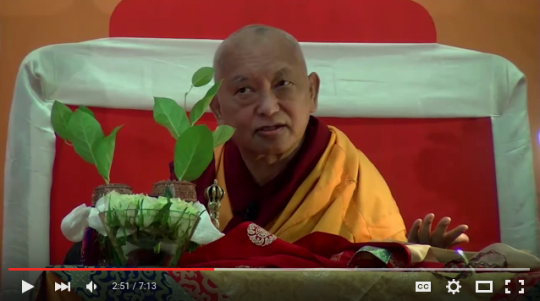
Screenshot from “It Is Very Strange That We Dont Know What the I Is”
“Whether a believer or non-believer, the most important thing is to actualize ultimate wisdom,” Lama Zopa Rinpoche teaches in a new video available on FPMT’s YouTube channel. The teaching took place during Rinpoche’s July 2015 visit to Copenhagen, Denmark, organized by Tong-nyi Nying-Je Ling. “It is the most important thing to eliminate the root of samsara, to eliminate directly the root of samsara, the root of all suffering, not just cancer, not just diarrhea, not just a headache, but the entire suffering or rebirth, old age, sickness, and death.
“If you don’t want to die then you have to actualize it. If you don’t want to be reborn, if you don’t want to get old or fall sick, you must actualize the ultimate wisdom realizing the ultimate truth. You have to know what is the I.
“We have been believing in the I from beginningless rebirths, not only from this morning, not only from the time of conception. No, from beginningless rebirths we have been believing in the I, doing everything for the I, to get power, to get happiness, to get power, to get everything for the I. But we don’t know what the I is.
“It is very, very strange that we don’t know what the I is but we do everything for the I. Can you imagine? You spend a billion dollars, a zillion dollars, those who have dollars you spend everything, also those who have one dollar, everything, you are slave to the I. It is kind of like that but you don’t know what the I is. You have no idea of the I. It is very strange, completely strange.”
Watch “It Is Very Strange That We Don’t Know What the I Is” on YouTube: https://www.youtube.com/watch?v=TvbzUSc1GQA
You can watch more video clips of Lama Zopa Rinpoche on FPMT’s YouTube page: http://bit.ly/fpmt-youtube
For longer videos of Rinpoche teaching, visit: http://bit.ly/rinpoche-available-now
Learn more about Lama Zopa Rinpoche, spiritual director of the Foundation for the Preservation of Mahayana Tradition (FPMT), and Rinpoche’s vision for a better world. Sign up to receive news and updates.
- Tagged: lama zopa rinpoche, video, youtube
- 0
11
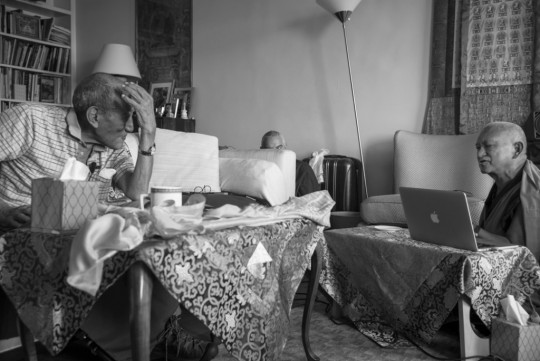
Khyongla Rato Rinpoche giving oral transmissions to Lama Zopa Rinpoche, New York, US, August 2015. Photo by Nicholas Vreeland.
Lama Zopa Rinpoche recently traveled to New York state, where he is visiting Khyongla Rato Rinpoche, one of his teachers. Lama Zopa Rinpoche is receiving oral transmissions from Khyongla Rato Rinpoche during his visit.
Lama Zopa Rinpoche will be teaching in New York City August 21, 27 and 28 with a Guru Puja scheduled for August 25, all organized by Shantideva Meditation Center. Visit their website for more details.
Lama Zopa Rinpoche is the spiritual director of the Foundation for the Preservation of Mahayana Tradition (FPMT), a Tibetan Buddhist organization dedicated to the transmission of the Mahayana Buddhist tradition and values worldwide through teaching, meditation and community service.
10
“Each time pride arises, it leaves negative imprints on the mind,” Lama Zopa Rinpoche said in “Overwhelmed by Pride,” a response to a student asking for advice on how to curb prideful thinking. “It causes strong delusions to arise. … As it says in the thought transformation teachings, examine yourself and think of all the ignorance that exists in your mind and how many subjects you don’t know about. Also, think of all the phenomena that exist and all the subjects that you don’t know about. What you know is so little, hardly anything. There is so much ignorance. In this way, focus on your shortcomings.
“Think that the realizations in your mind are so small. They are not there, not even the realization of death and impermanence, or the realization of a precious human rebirth. You do not have even those realizations.
“In this way reflect on your shortcomings, including mistakes made in the past. Thinking like this immediately makes you feel lower and helps you feel respect for others.
“In the Bodhisattva’s Way of Life, it says: ‘With my actions, I want to achieve a human body in my next life, but what I create is only negative karma, so there is only non-virtue being created.’
“If you examine your actions daily and your motivation, you will see that your main motivation is for this life only. Most actions are performed out of attachment, not just attachment seeking happiness in this life, but also attachment clinging to this life’s happiness. Actually, 24 hours a day your attitude is attachment. That means even our Dharma actions are performed with this motivation, with the thought of this life’s happiness. So that means 24 hours a day your life becomes non-virtue, so the ripened result is to be reborn in the lower realms. This means all your actions are non-virtuous, including meditation and prayers. All of these also become non-virtue. That is what the quote means.
“When pride arises when you see others who have lower qualities, an ugly body, less possessions, no realizations, and so forth, the antidote is to think about the good qualities that they do have. Even if the person has shortcomings, think on the side of their good qualities. That is one antidote. … ”
Find the complete teaching in the “Pride” section of “Emotions” in the Lama Yeshe Wisdom Archive’s Online Advice Book: http://bit.ly/online-advice-book-pride
Learn more about Lama Zopa Rinpoche, spiritual director of the Foundation for the Preservation of Mahayana Tradition (FPMT), and Rinpoche’s vision for a better world. Sign up to receive news and updates.
7
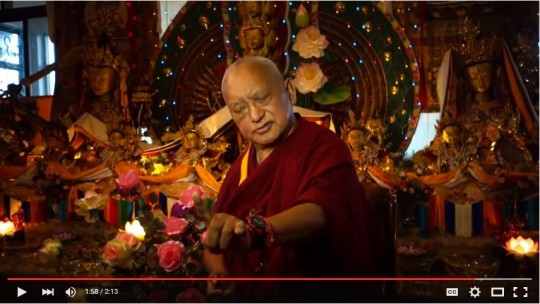
Screenshot of “Real Buddhism Is Not to Harm Others”
“Buddha is like the doctor because, as I’ve explained, we have disease and he has medicine,” Lama Zopa Rinpoche teaches in a new video on FPMT’s YouTube channel. “Dharma is like the medicine. The Sangha is like the nurse. When you take refuge in the Dharma, when you rely on Dharma, what you have to abandon is harming others, even by death. Through understanding, when you take the refuge ceremony, when you take refuge in Dharma, rely on Dharma – try not to harm yourself, try not to harm others. …”
Watch “Real Buddhism Is to Not Harm Others” on YouTube:
https://www.youtube.com/watch?v=boBcjQLcs1E
You can watch more video clips of Lama Zopa Rinpoche on FPMT’s YouTube page: http://bit.ly/fpmt-youtube
For longer videos of Rinpoche teaching, visit: http://bit.ly/rinpoche-available-now
Learn more about Lama Zopa Rinpoche, spiritual director of the Foundation for the Preservation of Mahayana Tradition (FPMT), and Rinpoche’s vision for a better world. Sign up to receive news and updates.
- Tagged: lama zopa rinpoche, video, youtube
- 0
6
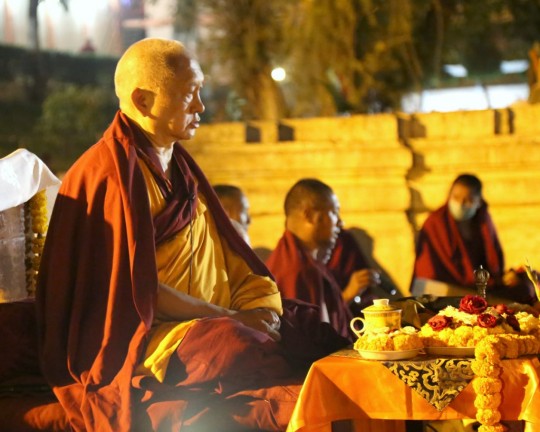
Lama Zopa Rinpoche at the Mahabodhi Stupa, Bodhgaya, India, February 2015. Photo by Ven. Thubten Kunsang.
“It is extremely important to pay attention to patience in everyday life,” Lama Zopa Rinpoche said in “The Most Important Practice of Patience,” a teaching made available as part of Mandala‘s July-December 2015 online content. “Not only we who want to practice lam-rim – the graduated path to enlightenment – but even nonbelievers need to practice patience so that their relationships with their wives, parents, friends, even with outside relationships, can last longer.
“Even nonbelievers, of course, would like happiness and long-lasting relationships in the family. So if you don’t practice patience and compassion and the good heart, and don’t try to control the mind of desire, then relationships don’t last. You become enemies to each other. Before the other person becomes an enemy, you become enemy to that person. There can be danger like that.
“It’s an incredibly important education and a good quality for human life, even if you don’t believe in karma or reincarnation, practicing patience is so, so, so important. You don’t learn that in school; you don’t learn that in university. But it’s the most important lesson, which brings happiness and peace, good and warm relationships, and long-lasting happiness in relationships.
“For people who are practicing Dharma, lam-rim, then there’s no question that it’s even more important – this is the most important practice. …”
Learn Dharma strategies for developing patience:
https://fpmt.org/mandala/archives/mandala-for-2015/july/the-most-important-practice-of-patience/
Learn more about Lama Zopa Rinpoche, spiritual director of the Foundation for the Preservation of Mahayana Tradition (FPMT), and Rinpoche’s vision for a better world. Sign up to receive news and updates.
- Tagged: lama zopa rinpoche, patience
- 0
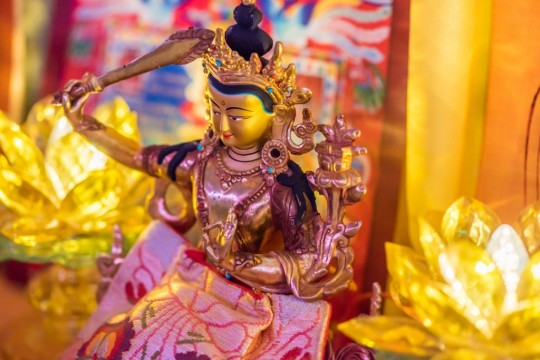
Manjushri statue, Buddha Amitabha Pure Land, Washington, US, June 2015. Photo by Chris Majors.
“If we do some profound scientific analysis, some inner scientific analysis, we can see how much we believe in this totally real I that actually does not exist,” Lama Zopa Rinpoche says in a teaching in the just published Lama Yeshe Wisdom Archive July 2015 E-letter. “It appears to be real from its own side, we believe it to be real one hundred percent, but it is not there. By doing this inner scientific analysis, this meditation, we can come to see this very subtle point, the nonexistence of this ‘real’ I.
” … Our whole life is spent afraid of something happening to this I, to this real I that appears from there. We totally, a hundred percent believe it is real and we do everything we possibly can to protect this real I, which is not there. We see all the possibilities of being hurt. ‘This will make me sick. This will kill me. This will hurt me.’ We take every possible precaution to prevent this real I that doesn’t exist from being hurt.
“Determined to keep fit, we do hours of exercise every day, by jogging or working out on machines. There is a big industry making new types of machines for our real I to keep fit on. As soon as a new machine has been on the market a few months a new one comes out and our real I has to have it. Each machine makes us do it differently – from lying upside down to putting our head between our legs – and we are forced to buy new ones because the experts in advertisements convince us this new one is better.
“All this is done for our real I, for the I that appears real and we believe a hundred percent is truly there. Even exercising the body, doing many hundreds of push-ups, is for this real I. Everybody jogging, running and doing exercises is doing it so that this I does not get sick. They are protecting this I. They have injections to prevent diseases before they happen. They take every single precaution they can to protect this real I.
“If we were to meditate for just one day, analyzing, checking, going to a subtler level, we would see that this real I is not there! What appears as the real I, what we believe a hundred percent to be real, is not there. However, we don’t check and this labeling process goes on continuously. It has been going on since we were born and will continue up to death. …”
Read Lama Yeshe Wisdom Archive’s July 2015 E-letter and the complete teaching online.
Lama Zopa Rinpoche is the spiritual director of the Foundation for the Preservation of Mahayana Tradition (FPMT), a Tibetan Buddhist organization dedicated to the transmission of the Mahayana Buddhist tradition and values worldwide through teaching, meditation and community service.
4
Thought Transformation
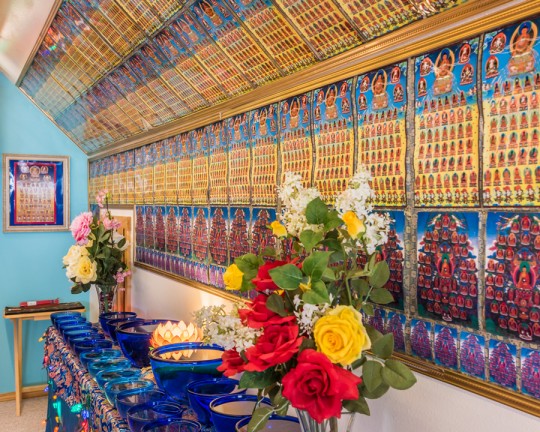
Offerings and scores of images of the 35 Buddhas of Confession in Lama Zopa Rinpoche’s room at Buddha Amitabha Pure Land, Washington, US, June 2015. Photo by Chris Majors.
A student wrote Lama Zopa Rinpoche:
You asked me to read an article about how to transform depression into the path and also to concentrate on purification practices like confession to the Thirty-five Buddhas. I did not faithfully do them every day. However, I would like to thank you as you told me my depression and sufferings are a result of purification, of me trying to do something about Dharma.
Since I took refuge, everything in my life has gone wrong: my relationships, my health and my ability to work. I woke up each day and was fearful, wondering how I could cope with another day. However, while all these problems were manifesting, I had incredible opportunities to do retreat and to meet with a lot of holy beings who guided me personally. I also had, and still have, the opportunity to study Dharma. The most important thing, I feel, is that I am glad that I did not give up my lama.
Now after all these years of things going wrong, I suddenly realized that I am happy that all these have happened. It became so clear that everything—friends, relatives, this world and even my body—are all sufferings. I don’t think this is renunciation, but at least now I am recovered from depression and have started to reclaim my life: to eat right, to sleep right, and to start to have the energy and mind to take care of my personal household matters and work hard. Anyway, I just want to thank you and tell you that I truly am happy that I had all of these sufferings. They groomed me for who I am now
Rinpoche responded:
My very dear, precious, kind, wish-fulfilling one,
Thank you very much for your kind letter and I’m so happy that you realized all the difficulties you have been through are positive.
Generally, the whole lam-rim is thought transformation, but there is thought transformation separate from the lam-rim. That thought transformation is when you utilize obstacles to practicing Dharma on the path to enlightenment–then you don’t have obstacles to practice Dharma! You use any difficulties like this for sentient beings to achieve enlightenment, not just temporary happiness and for yourself to achieve enlightenment. It’s unbelievable, most unbelievable and makes your life—even your death—most beneficial for sentient beings. This is what really we should practice.
The Kadampa Geshe Khamlungpa said among his advices: “This present small suffering being experienced purifies past negative karma (collected from beginingless past lives). Therefore, there will be happiness in the future. Therefore, rejoice in the suffering.” This means that experiencing suffering is very good, positive—that’s what he is saying. This is Kadampa Geshe Khamlungpa’s advice. So, all the usual complaints against you then are very positive.
Any praise, any good things are a cause for delusion to rise, so that’s no good and the opposite to renunciation. The bodhisattva Togme Sangpo has advised that whether you experience good or whether you experience bad, it’s all to use for enlightenment. It all depends on which label you chose to give. If you give a bad label to everything, everything becomes bad, becomes lung. So it’s very, very, very good that you took everything, that you understood everything as a way to achieve enlightenment. The way you think helps the mind to be more satisfied; everything brings peace of mind; everything becomes Dharma. That’s very wise; that’s REAL wise. Even for top political people in the world, I don’t think they know this. Take it as positive.
Thank you very much. Have a good life.
With much love and prayers,
Lama Zopa
Scribed by Ven. Sarah Thresher, Root Institute, Bodhgaya, India, February 2015. Edited by Mandala for inclusion on FPMT.org.
Learn more about Lama Zopa Rinpoche, spiritual director of the Foundation for the Preservation of Mahayana Tradition (FPMT), and Rinpoche’s vision for a better world. Sign up to receive news and updates.
- Home
- News/Media
- Study & Practice
- About FPMT Education Services
- Latest News
- Programs
- New to Buddhism?
- Buddhist Mind Science: Activating Your Potential
- Heart Advice for Death and Dying
- Discovering Buddhism
- Living in the Path
- Exploring Buddhism
- FPMT Basic Program
- FPMT Masters Program
- FPMT In-Depth Meditation Training
- Maitripa College
- Lotsawa Rinchen Zangpo Translator Program
- Universal Education for Compassion & Wisdom
- Online Learning Center
- Prayers & Practice Materials
- Overview of Prayers & Practices
- Full Catalogue of Prayers & Practice Materials
- Explore Popular Topics
- Benefiting Animals
- Chenrezig Resources
- Death & Dying Resources
- Lama Chopa (Guru Puja)
- Lama Zopa Rinpoche: Compendium of Precious Instructions
- Lama Zopa Rinpoche: Life Practice Advice
- Lama Zopa Rinpoche Practice Series
- Lamrim Resources
- Mantras
- Prayer Book Updates
- Purification Practices
- Sutras
- Thought Transformation (Lojong)
- Audio Materials
- Dharma Dates – Tibetan Calendar
- Translation Services
- Publishing Services
- Teachings and Advice
- Find Teachings and Advice
- Lama Zopa Rinpoche Advice Page
- Lama Zopa Rinpoche: Compendium of Precious Instructions
- Lama Zopa Rinpoche Video Teachings
- ༧སྐྱབས་རྗེ་བཟོད་པ་རིན་པོ་ཆེ་མཆོག་ནས་སྩལ་བའི་བཀའ་སློབ་བརྙན་འཕྲིན།
- Podcasts
- Lama Yeshe Wisdom Archive
- Buddhism FAQ
- Dharma for Young People
- Resources on Holy Objects
- Ways to Offer Support
- Centers
- Affiliates Area
- Teachers
- Projects
- Charitable Projects
- Make a Donation
- Applying for Grants
- News about Projects
- Other Projects within FPMT
- Support International Office
- Projects Photo Galleries
- Give Where Most Needed
- FPMT
- Shop
Translate*
*powered by Google TranslateTranslation of pages on fpmt.org is performed by Google Translate, a third party service which FPMT has no control over. The service provides automated computer translations that are only an approximation of the websites' original content. The translations should not be considered exact and only used as a rough guide.Faith alone never stops problems; understanding knowledge-wisdom always does. Lord Buddha himself said that belief in Buddha was dangerous; that instead of just believing in something, people should use their minds to try to discover their own true nature.









